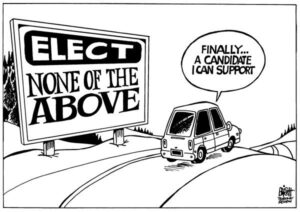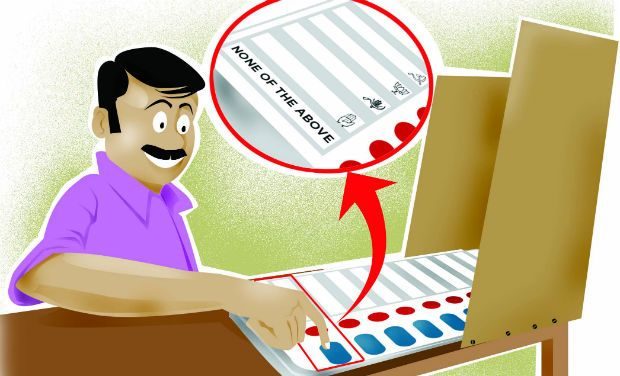With elections being the hot topic in Goa, people have gone wild about the results. But 10,919 people are watching and enjoying the show. Each and every vote is important but do all get taken into consideration?
Who are these 10,919 people?
In the pie chart above it shows the party wise vote share. BJP, INC, MGP, IND, AAP, GFP, NCP, GSM, UGP, GSRP, GVP and finally NOTA (None Of The Above). 10,919 people did not cast their vote for a single candidate. Instead, they left their choices open and chose NOTA.
The joy of achievement and agony of loss are yet to be digested by political fronts as well as voters. The fast-emerging trend in the State’s assembly polls has brought up a topic to talk about- NOTA.
In Goa, 1.2 percent of the voters chose NOTA (None of the Above), followed by 1 per cent in Uttarakhand, latest data available with the Election Commission of India showed.
What is NOTA?
You do not like any of the candidates listed. You get to select the NOTA aka None of the Above option on the EVM machine/ ballot paper, which means you vote none of the candidates and yet you practice your right to vote.
There are 40 constituencies in Goa, 70 in Uttarakhand, 60 in Manipur, 117 in Punjab and 403 in Uttar Pradesh. India is the 14th country to allow secret negative voting.
Is NOTA a game changer?
Even if most votes have been cast for NOTA option, the candidate with the largest number of votes will be declared winner. Technically, your vote is counted as an invalid vote and does not affect election results.
What if NOTA wins?
If NOTA receives the majority of votes in a particular constituency, then the candidate with the second highest number of votes wins. Simply put, NOTA is incapable of forcing a reelection even if it is the winner.
The Supreme court of India felt that an option like NOTA would force parties to project more honest candidates and in turn increase voter participation.
Before the NOTA option came into existence, people casting negative votes were required to enter their names in a register and cast their vote on a separate paper ballot. The presiding officer would then put a remark in the form and get it signed by the voter. This was done to prevent fraud or misuse of votes.
The EVMs have the NOTA option at the end of the candidates’ list. Earlier, in order to cast a negative ballot, a voter had to inform the presiding officer at the polling booth. A NOTA vote doesn’t require the involvement of the presiding officer.
This provision was, however, deemed unconstitutional by the SC as it did not protect the identity of the voter.
The SC said negative voting would even encourage people who are not satisfied with any of the candidates to turn up to express their opinion and reject all contestants.
The Section 49 (O) stood annulled after the SC cleared the NOTA provision. It gave the poll officials a chance to find out the reason behind the rejection of a candidate through the voter’s remarks in Form 17A. Through NOTA, the officials cannot find out the reason for the rejection. Moreover, it protects the identity of a voter, thus keeping the concept of secret balloting intact.
Leaders of the Bharatiya Janata Party, Narendra Modi, and LK Advani welcomed the NOTA provision. They, however, asked for another ‘electoral reform’. Both leaders said voting should be made mandatory.
“Voters, who without any legitimate justification, have not been exercising the valuable right of franchise the Indian Constitution has conferred on them have, unwittingly thus, been casting a negative vote against all the contesting candidates without intending to do so,” Advani wrote in a blog.
“I hold, therefore, that a negative vote would become really meaningful if it is accompanied also by the introduction of mandatory voting,” he added.
“Negative voting will lead to a systemic change in polls and political parties will be forced to project clean candidates. If the right to vote is a statutory right, then the right to reject a candidate is a fundamental right of speech and expression under the Constitution,” said a bench headed by then Chief Justice of India, P Sathasivam.
The bench also pointed out that the system of negative voting existed in several other countries. Even in Parliament, the MPs have the option to abstain from a vote.



